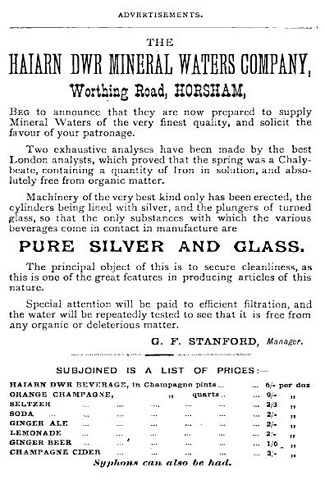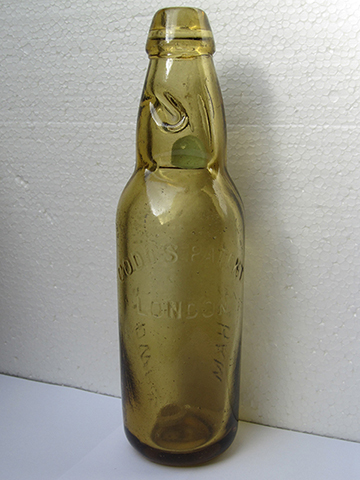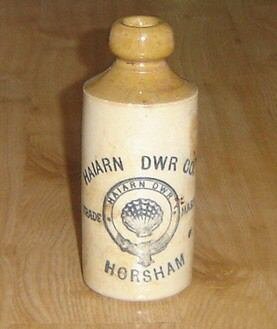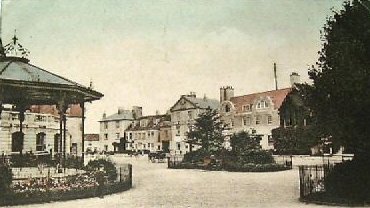The Haiarn Dwr
Mineral Waters Company
Horsham

The unusual Welsh name of the company, most famous for its early narrow neck amber codd, has intrigued me for some time, and I have often wondered if it would be possible to find out how they got their name, so I eventually decided to delve deeper into its history. This short article is merely material I have been able to find on the internet, and is in no way intended to be a comprehensive study of the firm. Local Horsham collectors should be able to provide further details.
 |
 |
Before going any further, it is worth noting that the firm's name is a literal Welsh translation of the phrase "Iron Water," however, there does not seem to be any Welsh connection or involvement, as the grammar is incorrect. In English the adjective is usually added before a word, such as "Iron Water," however, in Welsh it is the other way around, and to be grammatically correct it should read "Dwr Haiarn"
The first mention of the company I have been able to find is in Deacon's Court Guide, Gazetteer & County Blue Book of Sussex 1881, which says:
The works of the Haiarn Dwr Mineral Waters company are situated on the site of the old Horsham Baths. The water which is used by the company in their manufactures is taken from a chalybeate spring, and has been proved by eminent analysts to contain a quantity of iron in solution, and to be absolutely free from organic matter. Extensive machinery of the best kind is erected on the works, which are under the sole management of Mr. G. F. Stanford.
Deacon also carried an advert for the company (above), which places the factory at Worthing Road.
I have been able to trace George Francis Stanford through the census returns from 1861 to 1901, but at no time is he described as a mineral water manufacturer. He is variously described as a "Brewer and Maltster," (1901); "Brewers Manager," (1891); and "Brewers Clerk," (1881). On the other hand, in every trade directory the company is listed under "Mineral Water Manufacturers."
 |
George Stanford was born in Horsham in 1849, the son of George and Harriet Stanford. In 1861 George Senior was a Brewer's Clerk, although there is no indication of the name of the brewery. By 1871 George was described as a Brewer, and his son was a Clerk working for his father. In 1881 George Senior was retired, but younger son Oliver Alfred had joined the company as a clerk, where he was to remain up until at least 1901.
 |
In 1861 and 1871 the family lived at the Carfax, Horsham, moving to live at 10 London Road by the time of the 1881 census. By 1891 George Francis was living at 12 Worthing Road, which in the 1901 census was labelled "Worthing Road Brewery." According to Kelly's Directory of 1905, Haiarn Dwr was situated at 30 Worthing Road.
It is interesting to note the products listed in the 1881 advert and their prices. The Haiarn Dwr Beverage (in Champagne pints) would surely have been the "Haiarn Dwr," while the Orange Champagne, in champagne quarts at 9/- per dozen was the top of the range "posh stuff". I have seen examples of the firm's ginger beer bottles, but aside from the pictured amber codd, none of the company's other range of containers are familiar to me.
Above (right) is the famous narrow neck amber codd. This is embossed "HAIARN DWR/HORSHAM" on the front, and "CODDS PATENT/LONDON" to the rear. There is no makers name, and left is an example of the company's ginger beer bottles. To the right is a view of The Carfax from around 1904,
I have succeeded in satisfying my curiosity over the company's name, and am certain that there was no Welsh connection, the Stanford family being Horsham born and bred from at least the early 19th. Century. It appears that the name was simply a clever marketing ploy; after all, a Welsh name being used in the middle of Sussex could only have served to attract attention to itself. There must have been many a person whose idle curiosity led them into trying out the company's goods, and, human nature being what it is, the owners would have had to answer the question "What does it mean?" many times over the years, proving that an unusual name can only benefit a company from the publicity it attracts.
© K. Morris 2005


















